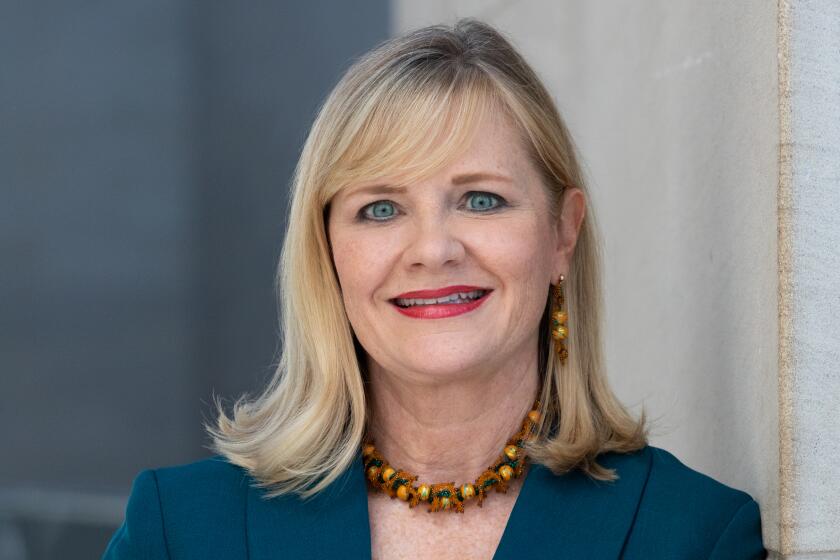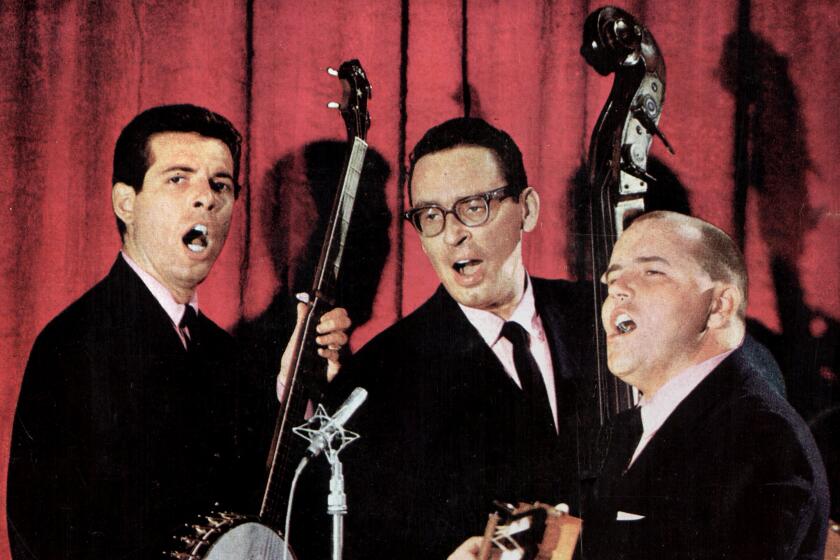His Compositions Are Spiked
What becomes a 10th anniversary most? Tonight, the Orange County Performing Arts Center will be celebrating its first decade of cultural service with an event of gala proportions. The musical fare will include such artists as mezzo-soprano Jennifer Larmore, baritone Gino Quilico and pianist Emanuel Ax, in performance with the Pacific Symphony Orchestra, conducted by Carl St.Clair, all framed by a champagne reception to open the festivities and a dinner dance to follow.
Because cultural celebrations of this magnitude demand some nod to new music--something that will live on after the Klieg lights go dark--the evening will also include the world premiere of what promises to be a frothy, even slightly inebriated, orchestral toast. This night, well-dressed revelers in Segerstrom Hall will sink their ears into Robert Xavier Rodriguez’s “Hot Buttered Rumba,” commissioned by the center as a “festive overture,” according to Rodriguez.
Listen to the composer’s account of the piece: “There’s a joke that hot-buttered rum is the drink that makes you see double and feel single. My rumba is a little tipsy. It goes in and out of regular meter, and in and out of regular tempo. It loses its footing and there are many orchestral evocations of tipsiness, a few raucous noises from my memories of Spike Jones and a few fond memories of the Xavier Cugat rumbas of the ‘50s.”
However flippantly Rodriguez may describe his latest brainchild, his intent and his compositional voice are serious, the result of an assiduously honed creative evolution. He has been amply, and regularly, rewarded for his efforts. Right after he emerged from the academic chute of USC (with a master’s degree in composition) back in 1971, he earned the Prix de Composition Musicale Prince Pierre de Monaco ID TK. His resume also includes a Guggenheim Fellowship, four NEA grants and other laurels that assure us that, if an orchestral rumba is in order, Rodriguez has the proper tools to make it work on a concert stage.
His opera “Frida,” about the heroic Mexican artist Frida Kahlo, has been presented in Boston, New York and Houston, while his 1986 children’s opera “Monkey See, Monkey Do” has had more than 1,000 performances to date. In 1991, John Rockwell, then of the New York Times, called “Frida” “genuinely original and genuinely accessible, a neat combination not that often achieved.”
Which is exactly Rodriguez’s aim.
“In my music, I always try to combine as many learned devices from the classical world--from the world in which I, after all, grew up--with the populist world. I believe Copland had it exactly right when he said that he wrote music to show what it felt like to be alive today. I want to have it all. I want to have the multilayered complexity of concert music of the symphonic tradition, even the rich atonal structures of the post-Webern tradition, and the toe-tapping immediacy of a rumba. I want professors to analyze the complexities and inversions, and I want children to clap along.
“Music is headed back in that direction,” Rodriguez continued, in a phone interview from his home in Dallas. “I think the late 19th century, early 20th century split between elitist and populist music is an unnatural split. I think we’re coming, once again, to see the two worlds as two sides of a single coin. The Kurt Weill revival that we’re seeing these days is a symptom of the hunger for that kind of duality in music.”
Rodriguez, born--in 1946--and raised in San Antonio, started out playing the piano, but was on the composer track by the time he hit college at the University of Texas at Austin. While he was studying at USC in the late ‘60s and early ‘70s, he also made jaunts to Paris to study with the legendary composition teacher Nadia Boulanger, whose students have included Aaron Copland, Philip Glass and Elliott Carter. Ultimately, an offer to teach at the University of Texas at Dallas took the composer back to the Lone Star State. This fall, he begins a three-year stint as composer-in-residence with the San Antonio Symphony, a post he previously held with the Dallas Symphony.
Stereotypes aside, the cultural legacy of Texas, in terms of classical music and especially opera, has long been the envy of other locales in the states. In the ‘50s, as Rodriguez was growing up, San Antonio, for example, boasted the San Antonio Opera, then one of the nation’s most prized companies.
“In Texas,” Rodriguez said, “we use the phrase ‘the Third Coast’ with some justification. I’m pleased to have built whatever reputation I have from the base in Texas, to prove that one does not have to be on the East or West coasts.”
That reputation began the way most did in the days before postmodernism and populism--in the grips of serialist orthodoxy. As Rodriguez recalled, “I was writing chic international, serious, serial music, as all young composers of my generation were obliged to do.”
It was Nadia Boulanger in Paris who insisted that his muse was elsewhere. “She told me that, in 10 years, I would--as they used to say in California--’get in touch with’ the comic side of my personality and make a reputation writing comic operas. She was absolutely right. Indeed, five of my eight operas are comedies. I very much have grown comfortable with that aspect.”
Along with his turn toward the comic muse, Rodriguez’s later development would also find him exploring his Latin roots. This current, self-described “Latin period” includes the soon-to-be unveiled “Hot Buttered Rumba.”
His personal roots project was sparked not by some burning inner passion but by pragmatism: the arrival of a commission. Ten years ago, the Dallas Opera asked Rodriguez to write what would become “Monkey See, Monkey Do,” a children’s opera set in a Mexican village. In preparation, he spent time researching Mexican folk music. The first step in the process was grappling with his own entrenched classical European orientation.
“I’d known [folk] music all my life, growing up in San Antonio,” he explained. “My parents on both sides are of Mexican descent. I speak Spanish. That background was completely comfortable to me. But, as a composer, I was in the international style and didn’t think of that part of my life as contributing to my music. When I got that commission, I went back to my own backyard.”
The process continued in 1991, when he took on “Frida,” on a commission from the American Music Theater Festival. Here, multicultural flavors were part and parcel of the subject at hand, in that “a good part of the story was the juxtaposition of American and Mexican culture, side by side, as Frida Kahlo and [her husband, noted painter] Diego Rivera came to the United States and interacted with Americans.”
Rodriguez has faced the kind of biases that his own bridge-building could help to erode. He recalled a conversation with a musicologist from Yale, in which they were discussing a Mexican conductor who also composed. “She did not know his music and she asked me what it was like. She asked, ‘Is it chugga chugga?’ She pantomimed playing imaginary maracas. I said, ‘No, it’s actually quite European and chic.’ She said, ‘Oh, too bad.’
“Here was the double bind of Latin symphonic musicians. If they are true to their Latin roots, they’re dismissed as being provincial, and if they deny Latin roots, they’re doing something artificial. So it’s a difficult challenge to be yourself, and, at the same time, to imbue your music with the layers of sophistication that the symphonic tradition expects.”
Despite the prejudices and challenges that greet a contemporary composer, let alone one with a multicultural mission, Rodriguez remains an optimist with a cause. He is also a composer well-endowed with commissions, who claims to know what he’ll be writing for the next three years. At present, one of his works-in-progress is a Concerto for Mariachis and Orchestra, a gently radical notion in keeping with his eclectic, culture-crossing agenda.
“This is as exciting a time to be alive as a composer as there has ever been in the history of the world,” he said. “After all, 30 years ago, when I was a serious young man, all of us composers were obliged to write in a certain style. There were things that we simply had to do or else we would not be taken seriously. Now, we can do anything. Now, I can write a rumba in 4/4, and people will enjoy it for what it is.
“Now, composers have the widest range possible. We can take any style and put it next to any other style. We have the richest toy chest in the history of the world.”
*
ORANGE COUNTY PERFORMING ARTS CENTER 10TH ANNIVERSARY GALA CONCERT AND CELEBRATION, Segerstrom Hall, 600 Town Center Drive, Costa Mesa. Date: Today, 5:00 p.m. Prices: $20-$85 (concert and champagne reception only); $500 (all gala events). Phone: (714) 556-2122, Ext. 550.
More to Read
The biggest entertainment stories
Get our big stories about Hollywood, film, television, music, arts, culture and more right in your inbox as soon as they publish.
You may occasionally receive promotional content from the Los Angeles Times.





